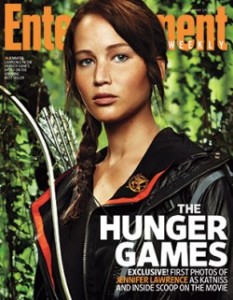 A friend and fellow PhD student is currently reading the Hunger Games trilogy, and she’s reading it compulsively, as required by the book itself.
A friend and fellow PhD student is currently reading the Hunger Games trilogy, and she’s reading it compulsively, as required by the book itself.
When we first heard about the terrible Oslo massacre of July 22nd, she sent me the following email:
it is watching things like this on the news that make me never want to think about how i ‘enjoyed’ the hunger games!
It is a controversial thing to say, but I was immediately struck by how true it sounded. I hadn’t even thought of making such an association, but now that she’d made it, I couldn’t get it out of my head.
Of course there is absolutely no direct link between the Hunger Games and the shooting perpetrated by Anders Behring Breivik. But watching the news and listening to the horrifying testimonies of the teenagers and young adults present on Utoya island during the seemingly neverending shooting, I cannot help but think, just like my friend did – This is what a cold, organised, mass killing of a country’s young people really looks like, and really feels like.
This is the kind of circumstances when you realise that the enjoyment of fiction can powerfully anaesthetise us to the real equivalent of what it portrays. The Hunger Games plays on both modern and ancient fears to force us to watch a horrible, but oh-so-compulsively-watchable, theatre of child and adolescent sacrifice. It is an artificial construction, of course – no less than a chimera to be enjoyed and feared at the same time. The teenagers in the Hunger Games are unnaturally equipped to deal with thoughts of death. They face it, they give it, they fight against it. Our fear and delight in reading about their endeavour is safely enclosed within the dystopian universe of the books.
And as a friend pointed out recently during a conversation, the hype surrounding the upcoming Hunger Games film is giving rise to a strangely morbid display of young actors and actresses whose roles are just numbers, on the model of ‘Laura Smith, n.3 – runs into trouble at the Cornucopia’. Understand: this pouty Californian blonde dies within the first ten minutes of the movie. But look at her! It’s her first big Hollywood part! She doesn’t die, of course – only her character, so that’s ok.
And suddenly we are interrupted in our desensitised reading of adolescent death by the occurrence of the unimaginable: scores of real, tangible, material adolescent deaths. Deaths that will entirely rewrite the history of the country, that will forever prevent hundreds of friends and relatives from living a normal life.
Of course there is nothing wrong with reading the Hunger Games. Of course we need catharsis, and we need fiction to meddle with our vision of reality and deal with its excesses. And of course the Hunger Games does not defend murder – it denounces it.
But when faced with such a brutal reality check, I am uncomfortable and uncertain. I will draw no conclusions other than ‘This is what the mass killing of a country’s young people really looks like.’
by Clementine – first posted on the Cambridge Children’s Literature Students’ Blog


Excellent post. I’ve JUST started reading The Hunger Games, and more because as a would-be professional in children’s literature I felt I should, so I can’t comment on the actual book. But I’ve been worried about the series since I first saw it on bookshelves for the very reason you describe.
I’m a huge supporter of edgy teen fiction that addresses difficult issues and emotions and situations – as long as it’s a discussion not a preach! What I dislike, in both film & book form, is a way of desensitising people (esp young people) to mass killing. Not just Oslo -how about child soldiers all over the world?
I’m hoping that when I read The Hunger Games (I’m literally just a chapter in so far) I’ll find something that doesn’t glamourise mass killing but highlights it. In which case I’ll be a fan. Otherwise, however well-written & compulsive it is, it’ll have the same uncomfortable feeling as watching a car crash. Or maybe I’m reading way too much into it!
Thanks for a fascinating post!
Thank you for your comment Rebecca! I agree, it’s a very complex case which is why I don’t want to draw definite conclusions. I think the Hunger Games do denounce mass murder, but they also trigger delight in the reader in watching these murders. And the families of the killed children are never shown, and they are often presented (apart from Rue) as ruthless and bloodthirsty anyway so it’s fine…
And you’re totally right – there are unfortunately many other instances of youth under threat in the world. But this particular killing, with the systematic/ methodical dimension of it, is chillingly fiction-like, isn’t it…
Um, you do realize that the hype surrounding The Hunger Games, is not due to the Arena and the killings? It has to do with the story of survival, and in subsequent novels “giving the power to the people”. As well as anyone in the fandom will tell you how important the message is in the trilogy of how our society is moving towards being numb to violence. How destructive war is, and how affects everyone and there are no winners. It should be praised that there is a section of todays’s youth who has recgonzed that message. As well as a nod to Suzzane Collins for getting that messagee to today’s youth.